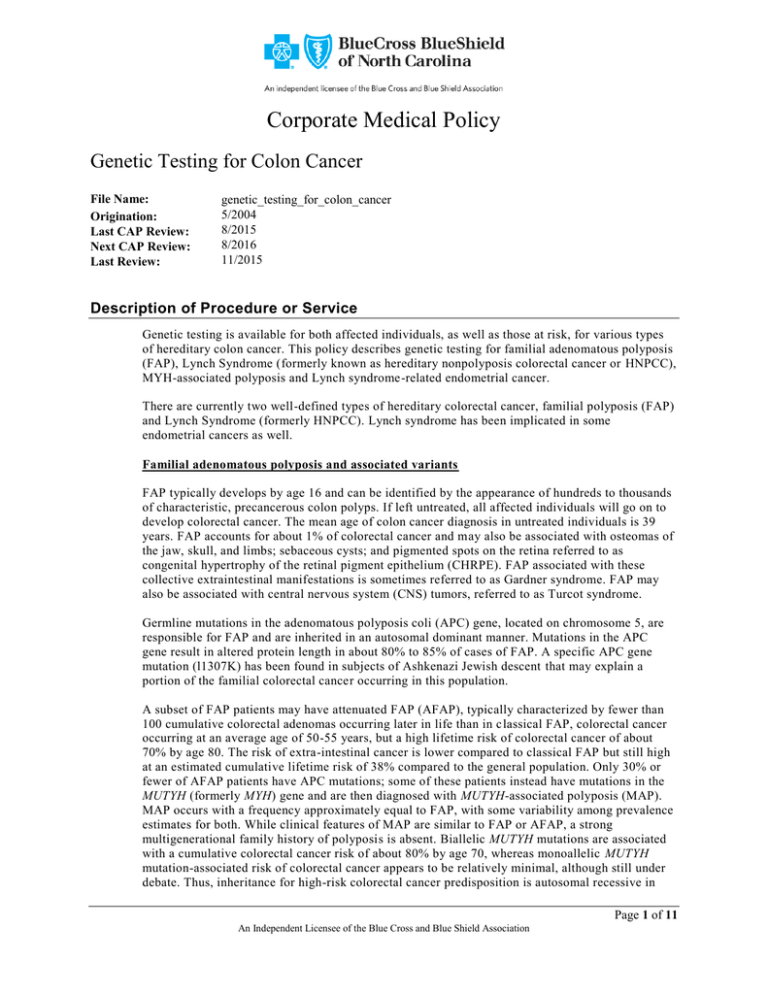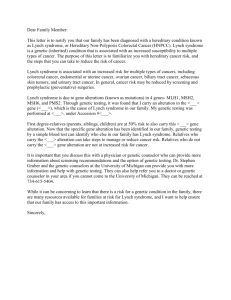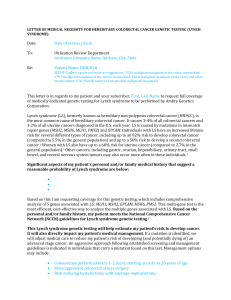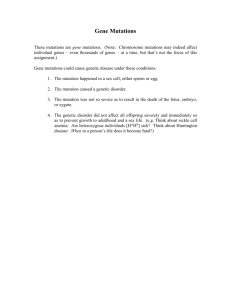Genetic Testing for Colon Cancer
advertisement

Corporate Medical Policy Genetic Testing for Colon Cancer File Name: Origination: Last CAP Review: Next CAP Review: Last Review: genetic_testing_for_colon_cancer 5/2004 8/2015 8/2016 11/2015 Description of Procedure or Service Genetic testing is available for both affected individuals, as well as those at risk, for various types of hereditary colon cancer. This policy describes genetic testing for familial adenomatous polyposis (FAP), Lynch Syndrome (formerly known as hereditary nonpolyposis colorectal cancer or HNPCC), MYH-associated polyposis and Lynch syndrome-related endometrial cancer. There are currently two well-defined types of hereditary colorectal cancer, familial polyposis (FAP) and Lynch Syndrome (formerly HNPCC). Lynch syndrome has been implicated in some endometrial cancers as well. Familial adenomatous polyposis and associated variants FAP typically develops by age 16 and can be identified by the appearance of hundreds to thousands of characteristic, precancerous colon polyps. If left untreated, all affected individuals will go on to develop colorectal cancer. The mean age of colon cancer diagnosis in untreated individuals is 39 years. FAP accounts for about 1% of colorectal cancer and may also be associated with osteomas of the jaw, skull, and limbs; sebaceous cysts; and pigmented spots on the retina referred to as congenital hypertrophy of the retinal pigment epithelium (CHRPE). FAP associated with these collective extraintestinal manifestations is sometimes referred to as Gardner syndrome. FAP may also be associated with central nervous system (CNS) tumors, referred to as Turcot syndrome. Germline mutations in the adenomatous polyposis coli (APC) gene, located on chromosome 5, are responsible for FAP and are inherited in an autosomal dominant manner. Mutations in the APC gene result in altered protein length in about 80% to 85% of cases of FAP. A specific APC gene mutation (l1307K) has been found in subjects of Ashkenazi Jewish descent that may explain a portion of the familial colorectal cancer occurring in this population. A subset of FAP patients may have attenuated FAP (AFAP), typically characterized by fewer than 100 cumulative colorectal adenomas occurring later in life than in c lassical FAP, colorectal cancer occurring at an average age of 50-55 years, but a high lifetime risk of colorectal cancer of about 70% by age 80. The risk of extra-intestinal cancer is lower compared to classical FAP but still high at an estimated cumulative lifetime risk of 38% compared to the general population. Only 30% or fewer of AFAP patients have APC mutations; some of these patients instead have mutations in the MUTYH (formerly MYH) gene and are then diagnosed with MUTYH-associated polyposis (MAP). MAP occurs with a frequency approximately equal to FAP, with some variability among prevalence estimates for both. While clinical features of MAP are similar to FAP or AFAP, a strong multigenerational family history of polyposis is absent. Biallelic MUTYH mutations are associated with a cumulative colorectal cancer risk of about 80% by age 70, whereas monoallelic MUTYH mutation-associated risk of colorectal cancer appears to be relatively minimal, although still under debate. Thus, inheritance for high-risk colorectal cancer predisposition is autosomal recessive in Page 1 of 11 An Independent Licensee of the Blue Cross and Blue Shield Association Genetic Testing for Colon Cancer contrast to FAP. When relatively few (i.e., between 10 and 99) adenomas are present and family history is unavailable, the differential diagnosis may include both MAP and Lynch syndrome; genetic testing in this situation could include APC, MUTYH if APC is negative for mutations, and screening for mutations associated with Lynch syndrome. It is important to distinguish among classical FAP, attenuated FAP, and MAP (mono - or biallelic) by genetic analysis because recommendations for patient surveillance and cancer prevention vary according to the syndrome. Lynch syndrome Patients with Lynch syndrome have a predisposition to colorectal cancer and other malignancies as a result of an inherited mutation in a DNA mismatch repair (MMR) gene. Lynch syndrome includes those with an existing cancer and those who have not yet develo ped cancer. The term “HNPCC” originated prior to the discovery of explanatory MMR mutations for many of these patients, and now includes some who are negative for MMR mutations and likely have mutations in as -yet unidentified genes. For purposes of clarity and analysis, the use of Lynch syndrome in place of HNPCC has been recommended in several recent editorials and publications. Lynch syndrome is estimated to account for 3% to 5% of all colorectal cancer and is also associated with an increased risk of other cancers such as endometrial, ovarian, urinary tract, and biliary tract cancer. Lynch syndrome is associated with a risk of developing colorectal cancer by age 70 years of approximately 27% to 45% for men, and 22% to 38% for women, after correction fo r ascertainment bias. Lynch syndrome patients who have colorectal cancer also have an estimated 16% risk of a second primary within 10 years. Lynch syndrome is associated with any of a large number of possible mutations in 1 of several MMR genes, known as MLH1, MSH2, MSH6, PMS2 and rarely MLH3, PMS1, and EX01. Risk of all Lynch syndrome-related cancers is markedly lower for carriers of a mutation in the MSH6 and PMS2 genes, although for most cancers still significantly higher than that of the general popu lation. Estimated cumulative risks of any associated cancer for a carrier of a mutation in any MMR gene do not begin to increase until after age 30 years. Lynch syndrome mutations are heterozygous; that is, only one of the 2 gene alleles contains a mutation. In rare cases both alleles contain the mutation, i.e., biallelic MMR gene mutations. This unusual syndrome has been described in multiple families and is to a large extent the result of consanguinity. Children with biallelic MMR mutations may develop e xtra-colonic cancers in childhood, such as brain tumors, leukemias, or lymphomas. Those unaffected or surviving early malignancies are at high risk of later colorectal cancer (average age of colorectal cancer diagnosis 16.4 years). Family history may not suggest Lynch syndrome. Prior to cancer diagnosis, patients may have multiple adenomatous polyps and thus may have an initial differential diagnosis of attenuated FAP versus MUTYH-associated polyposis versus Lynch syndrome. About 70% of Lynch syndrome patients have mutations in either MLH1 or MSH2. Testing for MMR gene mutations is often limited to MLH1 and MSH2 and, if negative, then MSH6 and PMS2 testing. Large gene sizes and the difficulty of detecting mutations in these genes make direct sequencing a time- and cost-consuming process. Thus, additional indirect screening methods are needed to determine which patients should proceed to direct seque ncing for MMR gene mutations. Available screening methods are microsatellite instability (MSI) testing or immunohistochemical (IHC) testing. BRAF testing is an optional screening method that may be used in conjunction with IHC testing for MLH1 to improve efficiency. A methylation analysis of the MLH1 gene can largely substitute for BRAF testing, or be used in combination to slightly improve efficiency. Mutations in MMR genes result in a failure of the mismatch repair system to repair errors that occur during the replication of DNA in tumor tissue. Such errors are characterized by the accumulation of alterations in the length of simple, repetitive microsatellite (2 to 5 base repeats) sequences that are Page 2 of 11 An Independent Licensee of the Blue Cross and Blue Shield Association Genetic Testing for Colon Cancer distributed throughout the genome, termed microsatellit e instability (MSI) and resulting in a MSIhigh tumor phenotype. MSI testing was standardized subsequent to a 2004 National Cancer Institute (NCI) workshop. Methodologic studies have also shown the importance of laser microdissection of the tumor tissue, comparison of tumor and normal cells, and a minimum proportion of tumor in relation to the quality of the test results. While the sensitivity of MSI testing is high, the specificity is low because approximately 10% of sporadic CRC are MSI-positive due to somatic hypermethylation of the MLH1 promoter. Additionally, some tumors positive for MSH6 mutations are associated with the MSI-low phenotype rather than MSI-high; thus MSI-low should not be a criterion against proceeding to MMR mutation testing. The BRAF gene is often mutated in colorectal cancer; when a particular BRAF mutation (V600E, a change from valine to glutamic acid at amino acid position 600 in the BRAF protein) is present; to date no MLH1 gene mutations have been reported. Therefore, patients ne gative for MLH1 protein expression by IHC, and therefore potentially positive for an MLH1 mutation, could first be screened for a BRAF mutation. BRAF-positive samples need not be further tested by MLH1 sequencing. MLH1 gene methylation largely correlates with the presence of BRAF-V600E and in combination with BRAF testing can accurately separate Lynch from sporadic colorectal cancer in IHC MLH1negative cases. Various attempts have been made to identify which patients with colon cancer should undergo testing for MMR mutations, based primarily on family history and related characteristics using criteria such as the Amsterdam II criteria (low sensitivity but high specificity) and the Bethesda guidelines (better sensitivity but poorer specificity). While fami ly history is an important risk factor and should not be discounted in counseling families, it has poor sensitivity and specificity for identifying Lynch syndrome. Based on this and other evidence, the Evaluation of Genomic Applications in Practice and Prevention (EGAPP) Working Group recommended testing all newly diagnosed patients with colorectal cancer for Lynch syndrome, using a screening strategy based on MSI or IHC (+BRAF) followed by sequencing in screen-positive patients. This recommendation includes genetic testing for the following types of patients: Family members of Lynch syndrome patients with a known MMR mutation; family members would be tested only for the family mutation; those testing positive would benefit from early and increased surveillance to prevent future CRC. Patients with a differential diagnosis of Lynch syndrome vs attenuated FAP versus MAP. Lynch syndrome patients. Genetic testing of the proband with CRC likely bene fits the proband where Lynch syndrome is identified and appropriate surveillance for associated malignancies can be initiated and maintained and benefits family members by identifying the family mutation. Analysis of human DNA in stool samples as a technique for colorectal cancer screening Detection of genetic abnormalities associated with colorectal cancer in stool samples has been proposed as a screening test for colorectal cancer. This technology is another potential alternative to currently available screening approaches such as fecal occult blood testing or colonoscopy. Several genetic alterations have been associated with colorectal cancer. In the proposed multistep model of carcinogenesis, the tumor suppressor gene p53 and the proto -oncogene K-ras are most frequently altered. Mutations in adenomatous polyposis coli (APC) genes and epigenetic markers (e.g., hypermethylation of specific genes) have also been detected. Colorectal cancer is also associated with DNA replication errors in microsatellite sequences (termed microsatellite instability or MSI) in patients with hereditary nonpolyposis colorectal cancer (formerly known as hereditary nonpolyposis colorectal cancer or HNPCC) and in a subgroup of patients with sporadic colon carcinoma. Tumor-associated gene mutations and epigenetic markers can be detected in exfoliated intestinal cells in stool specimens. Since cancer cells are shed into stool, tests have been developed that detect these genetic alterations in the DNA from shed colorectal cancer cells isolated from stool samples. Page 3 of 11 An Independent Licensee of the Blue Cross and Blue Shield Association Genetic Testing for Colon Cancer Several types of tests have been evaluated in studies and some have been marketed. One of these, PreGen-Plus™, tests for 21 different mutations in the p53, APC, and K-ras genes; the BAT-26 MSI marker; and incorporates the DNA Integrity Assay (DIA®). PreGen-Plus™ has not been cleared by the U.S. Food and Drug Administration (FDA). Although the scientific studies that are the basis of the PreGen-Plus™ test were conducted or funded by EXACT Sciences, LabCorp is identified as the test developer. LabCorp is regulated under the Clinical Laboratory Improvement Amendments (CLIA) of 1988 and is certified as qualified to perform high -complexity testing. As a result, LabCorp may develop tests in-house and offer them as laboratory services (i.e., laboratorydeveloped tests). Historically, the FDA has not regulated laboratory-developed tests. However, on January 13, 2006, the FDA sent correspondence to LabCorp indicating that PreGen-Plus™ may be subject to FDA regulation as a medical device. As a consequence, and as a result of studies showing better performance of other tests, this test is no longer offered. In August 2014, Exact Sciences received FDA premarket approval for its latest automated fecal DNA testing product, Cologuard™. Cologuard is intended for the qualitative detection of colorectal neoplasia associated DNA markers and for the presence of occult hemoglobin in human stool. Another currently available test is called ColoSure™, developed by OncoMethylome, which detects aberrant methylation of the vimentin (hV) gene. This test is offered as a laboratory -developed test, not subject to FDA regulation. Related Policies: Multigene Expression Assay for Predicting Recurrence in Colon Cancer Genetic Cancer Susceptibility Panels Using Next Generation Sequencing Molecular Analysis for Targeted Therapy for Non-Small Cell Lung Cancer ***Note: This Medical Policy is complex and technical. For questions concerning the technical language and/or specific clinical indications for its use, please consult your physician. Policy BCBSNC will provide coverage for Genetic Testing for Colon Cancer when it is determined to be medically necessary because the medical criteria and guidelines shown below are met. Analysis of Human DNA in Stool Samples is considered investigational as a screening technique for colorectal cancer. BCBSNC does not provide coverage for investigational services and procedures. Benefits Application This medical policy relates only to the services or supplies described herein. Please refer to the Member's Benefit Booklet for availability of benefits. Member's benefits may vary according to benefit design; therefore member benefit language should be reviewed before applying the terms of this medical policy. Please review Certificate for availability and limitations regarding benefits for genetic testing and counseling. When genetic testing for colon cancer is covered Genetic testing for APC gene mutations may be considered medically necessary in the following patients: At-risk relatives (see Policy Guidelines) of patients with FAP and/or a known APC mutation. Patients with a differential diagnosis of attenuated FAP vs. MUTYH-associated polyposis vs. Lynch syndrome. Whether testing begins with APC mutations or screening for MMR mutations depends upon clinical presentation. Page 4 of 11 An Independent Licensee of the Blue Cross and Blue Shield Association Genetic Testing for Colon Cancer Genetic testing for MUTYH gene mutations may be considered medically necessary in the following patients: Patients with a differential diagnosis of attenuated FAP vs. MUTYH-associated polyposis vs. Lynch syndrome and a negative result for APC gene mutations. Family history of no parents or children with FAP is consistent with MUTYHassociated polyposis (autosomal recessive). Genetic testing for MMR gene mutations is considered medically necessary in the following patients: Patients with colorectal cancer, for the diagnosis of Lynch syndrome. ( See Policy Guidelines section) Patients with endometrial cancer and one first-degree relative diagnosed with a Lynch-associated cancer (see Policy Guidelines), for the diagnosis of Lynch syndrome. At-risk relatives (see Policy Guidelines) of patients with Lynch syndrome with a known MMR mutation. Patients with a differential diagnosis of attenuated FAP vs. MUTYH-associated polyposis vs. Lynch syndrome. Whether testing begins with APC mutations or screening for MMR mutations depends upon clinical presentatio n. Patients without colorectal cancer but with a family history meeting the Amsterdam or Revised Bethesda criteria, when no affected family members have been tested for MMR mutations. Genetic testing for EPCAM mutations is considered medically necessary when any one of the following 3 major criteria are met: Patients with colorectal cancer, for the diagnosis of Lynch syndrome (see Policy guidelines Section) when: a. Tumor tissue shows lack of MSH2 expression by immunohistochemistry and patient is negative for a germline mutation in MSH2; or b. Tumor tissue shows a high level of microsatellite instability and patient is negative for a germline mutation in MSH2, MLH1, PMS2, and MSH6; OR At-risk relatives (see Policy Guidelines) of patients with Lynch syndrome wi th a known EPCAM mutation; OR Patients without colorectal cancer but with a family history meeting the Amsterdam or Revised Bethesda criteria, when no affected family members have been tested for MMR mutations, and when sequencing for MMR mutations is negative. Genetic testing for BRAF V600E or MLH1 promoter methylation may be considered medically necessary to exclude a diagnosis of Lynch syndrome when MLH1 protein is not expressed in a colorectal cancer on immunohistochemical (IHC) analysis. Pre- and post-test genetic counseling may be considered medically necessary as an adjunct to the genetic testing itself. When genetic testing for colon cancer is not covered Genetic testing for colon cancer is considered not medically necessary when the criteria listed above have not been met. Genetic testing for APC gene mutations is considered not medically necessary for colorectal cancer patients with classical FAP for confirmation of the FAP diagnosis. Genetic testing for all other gene mutations for Lynch syndrome or colorectal cancer is considered Page 5 of 11 An Independent Licensee of the Blue Cross and Blue Shield Association Genetic Testing for Colon Cancer investigational. DNA analysis of stool samples is considered investigational as a screening technique for colorectal cancer in patients with average, moderate, or high risk for colorectal cancer. Policy Guidelines Due to the high lifetime risk of cancer of the majority of the genetic syndromes discussed in this policy, “at-risk relatives” primarily refers to first-degree relatives. However, some judgment must be allowed, for example, in the case of a small family pedigree, when extended family members may need to be included in the testing strategy. It is recommended that, when possible, initial genetic testing for FAP or Lynch syndrome be performed in an affected family member so that testing in unaffected family members can focus on the mutation found in the affected family member. In many cases, genetic testing for MUTYH gene mutations should first target the specific mutations Y165C and G382D, which account for more than 80% of mutations in Caucasian populations, and subsequently proceed to sequencing only as necessary. In other ethnic populations, however, proceeding directly to sequencing is appropriate. For patients with colorectal cancer being evaluated for Lynch syndrome, either the microsatellite instability (MSI) test, or the immunohistochemistry (IHC) test with or without BRAF gene mutation testing, should be used as an initial evaluation of tumor tissue prior to MMR gene analysis. Both tests are not necessary. Consideration of proceeding to MMR gene sequencing would depend on results of MSI or IHC testing. IHC testing in particular may help direct which MMR gene likely contains a mutation, if any, and may also provide some additional informat ion if MMR genetic testing is inconclusive. When indicated, genetic sequencing for MMR gene mutations should begin with MLH1 and MSH2 genes unless otherwise directed by the results of IHC testing. Standard sequencing methods will not detect large deletions or duplications; when MMR gene mutations are expected based on IHC or MSI studies but none are found by standard sequencing, additional testing for large deletions or duplications is appropriate. The COLARIS® test from Myriad Genetic Laboratories includes sequence analysis of MLH1, MSH2, MSH6 and PMS2; large rearrangement analysis for MLH1, MSH2, PMS2, and MSH6 large deletions/duplications; and analysis for large deletions in the EPCAM gene near MSH2. Note that there may be 2 versions of this test, the COLARIS (excludes PMS2 testing) and COLARIS Update (includes PMS2 testing). Testing is likely done in stages, beginning with the most common types of mutations. Individualized testing (e.g., targeted testing for a family mutation) can also be requested. The COLARIS® AP test from Myriad Genetic Laboratories includes DNA sequencing analysis of the APC and MUTYH genes, as well as analysis of large rearrangements in the APC gene that are not detected by DNA sequencing. Additionally, immunohistochemical (IHC) testing for BRAF V600E or MLH1 promoter methylation may be considered medically necessary to exclude a diagnosis of Lynch syndrome when MLH1 is not expressed in the colorectal tumor. Amsterdam II Clinical Criteria (all criteria must be fulfilled) The Amsterdam criteria are the most stringent criteria for defining families at high risk for Lynch Syndrome: 3 or more relatives with an associated cancer (colorectal cancer, or cancer of the endometrium, small intestine, ureter or renal pelvis); 1 should be a first-degree relative of the other 2; 2 or more successive generations affected; Page 6 of 11 An Independent Licensee of the Blue Cross and Blue Shield Association Genetic Testing for Colon Cancer o o 1 or more relatives diagnosed before the age of 50 years; Familial adenomatous polyposis (FAP) should be excluded in cases of colorectal carcinoma; Tumors, if available, should be verified by pathologic examination. Modifications: EITHER: very small families, which cannot be further expanded, can be considered to have HNPCC with only 2 colorectal cancers in first -degree relatives if at least 2 generations have the cancer and at least one case of colorectal cancer was diagnosed by the age of 55 years; OR: in families with 2 first-degree relatives affected by colorectal cancer, the presence of a third relative with an unusual early-onset neoplasm or endometrial cancer is sufficient. Revised Bethesda Guidelines (fulfillment of any criterion meets guidelines). The Bethesda guidelines are less strict than the Amsterdam criteria and are intended to increase the sensitivity of identifying at-risk families. The Bethesda guidelines are also felt to be more useful in identifying which patients with colorectal cancer should have their tumors tested for microsatellite instability and/or immunohistochemistry: Colorectal carcinoma (CRC) diagnosed in a patient who is less than 50-years old; Presence of synchronous (at the same time) or metachronous (at another time i.e. a recurrence of) CRC or other Lynch syndrome-associated tumors, regardless of age; CRC with high microsatellite instability histology diagnosed in a patient less than 60-years old; CRC diagnosed in one or more first-degree relatives with a Lynch syndromeassociated tumor, with one of the cancers being diagnosed at younger than 50 years of age; CRC diagnosed with one or more first-degree relatives with an HNPCC-related tumor (colorectal, endometrial, stomach, ovarian, pancreas, bladder, ureter and renal pelvis, biliary tract, brain [usually glioblastoma as seen in Turcot syndrome], sebaceous bland adenomas and keratoacanthomas in Muir-Torre syndrome, and carcinoma of the small bowel), with one of the cancers being diagnosed at younger than age 50 years, OR CRC diagnosed in 2 or more first- or second-degree relatives with HNPCC-related tumor, regardless of age. The evidence on the accuracy of stool DNA as a screening test for colorectal cancer consists of a number of studies that have compared stool DNA analysis to colonoscopy and one large population screening study that compared stool DNA testing and FIT (fecal immunochemical testing), using colonoscopy as the reference standard. The population screening study reported stool DNA analysis has higher sensitivity and lower specificity than FIT . Earlier studies report a low to moderate sensitivity and a high specificity for stool DNA analysis. The sensitivity varies widely in the available studies and the evidence is not sufficient to determine the true sensitivity of stool DNA testing. In addition to uncertainty about the diagnostic accuracy of stool DNA analysis, clinical utility has not yet been demonstrated since there is no evidence that this test improves outcomes. The studies of diagnostic accuracy for detecting cancer and cancer precursors does not establish efficacy for prevention of colorectal cancer. Effective screening for colorectal cancer requires a screening program with established screening intervals and appropriate follow -up for positive tests. For fecal DNA testing, compliance with testing, ie, successful completion and return of the test is not known and may substantially impact outcomes. Billing/Coding/Physician Documentation Information This policy may apply to the following codes. Inclusion of a code in this section does not guarantee that it will be reimbursed. For further information on reimbursement guidelines, please see Administrative Policies on the Blue Cross Blue Shield of North Carolina web site at www.bcbsnc.com. They are listed in Page 7 of 11 An Independent Licensee of the Blue Cross and Blue Shield Association Genetic Testing for Colon Cancer the Category Search on the Medical Policy search page. Applicable codes: 81201, 81202, 81203, 81210, 81276, 81288, 81292, 81293, 81294, 81295, 81296, 81297, 81298, 81299, 81300, 81301, 81317, 81318, 81319, 81401, 81402, 81406, 81435, 81436, 81528, 96040, G0452. There are CPT genetic testing modifiers specific to MLH1 (-OJ), and MSH2, MSH6 or PMS2 (-OK). HCPCS codes listed above are more specific to the genetic tests provided, and should be used when appropriate. Genetic testing for colon cancer is not widely available and is most commonly performed by commercial reference labs or research labs dedicated to genetic testing in general. Associated genetic counseling performed by a trained genetic counselor would be coded using CPT 96040. Genetic counseling performed by a physician is coded using the appropriate evaluation and management codes. BCBSNC may request medical records for determination of medical necessity. When medical records are requested, letters of support and/or explanation are often useful, but are not sufficient documentation unless all specific information needed to make a medical necessity determination is included. Scientific Background and Reference Sources BCBSA Medical Policy Reference Manual [Electronic Version]. 2.04.08, 12/17/03. BCBSA Medical Policy Reference Manual [Electronic Version]. 2.04.29, 10/9/03. ECRI. (2002, January) Microsatellite instability testing for hereditary nonpolyposis colorectal cancer (Issue No. 64) Windows on Medical Technology. Specialty Matched Consultant Advisory Panel - 5/2004 BCBSA Medical Policy Reference Manual [Electronic Version]. 2.04.29, 4/1/2005. BCBSA Medical Policy Reference Manual [Electronic Version]. 2.04.08, 5/23/2005. Specialty Matched Consultant Advisory Panel - 4/2006 Specialty Matched Consultant Review 5/18/2007 BCBSA Medical Policy Reference Manual [Electronic Version]. 2.04.29, 9/18/07. BCBSA Medical Policy Reference Manual [Electronic Version]. 2.04.08, 4/25/06. Specialty Matched Consultant Advisory Panel - 4/2008 BCBSA Medical Policy Reference Manual [Electronic Version]. 2.04.29, 12/10/09 BCBSA Medical Policy Reference Manual [Electronic Version]. 2.04.08, 2/11/10 Specialty Matched Consultant Advisory Panel – 10/2011 BCBSA Medical Policy Reference Manual [Electronic Version]. 2.04.29, 11/10/11 BCBSA Medical Policy Reference Manual [Electronic Version]. 2.04.08, 11/10/11 Page 8 of 11 An Independent Licensee of the Blue Cross and Blue Shield Association Genetic Testing for Colon Cancer Specialty Matched Consultant Advisory Panel – 8/2012 BCBSA Medical Policy Reference Manual [Electronic Version]. 2.04.08, 11/8/12 BCBSA Medical Policy Reference Manual [Electronic Version]. 2.04.29, 11/8/12 Specialty Matched Consultant Advisory Panel – 8/2013 BCBSA Medical Policy Reference Manual [Electronic Version]. 2.04.08, 11/14/13 BCBSA Medical Policy Reference Manual [Electronic Version]. 2.04.29, 11/14/13 Senior Medical Director – 1/2014 Specialty Matched Consultant Advisory Panel- 8/2014 BCBSA Medical Policy Reference Manual [Electronic Version]. 2.04.29, 11/13/14 BCBSA Medical Policy Reference Manual [Electronic Version]. 2.04.08, 11/13/14 Specialty Matched Consultant Advisory Panel- 8/2015 State Center for Health Statistics, North Carolina Department of Health and Human Services. North Carolina Central Cancer Registry. Statistics and Reports: Cancer. http://www.schs.state.nc.us/data/cancer.cfm State Center for Health Statistics, North Carolina Department of Health and Human Services. North Carolina Central Cancer Registry. Projected New Cancer Cases and Deaths For All Sites, 2014. http://www.schs.state.nc.us/schs/CCR/proj14site.pdf U.S. Preventive Services Task Force. Screening for Colorectal Cancer. Preventive Services Task Force recommendation statement. Ann Intern Med. 2008;149(9):627-637. PMID BCBSA Medical Policy Reference Manual [Electronic Version]. 2.04.08, 11/1 2/15 BCBSA Medical Policy Reference Manual [Electronic Version]. 2.04.08, 2/11/16 Policy Implementation/Update Information 6/10/04 New policy originated. Genetic Testing for Colon Cancer may be covered when medically necessary criteria is met. Specialty Matched Consultant Advisory Panel review. Notification 6/10/2004. Effective date 8/12/2004. 1/5/06 No change in policy statement. References added. 5/22/06 Specialty Matched Consultant Advisory Panel review 4/20/2006. Updated the Amsterdam II and Revised Bethesda Criteria in the "When Covered" section. Added HCPCS codes S3828, S3829, S3830, S3831, S3833, S3834, S3890 as they rela te to this policy. References added. 8/13/07 Added information related to Muir-Torre Syndrome to "Description" section. Added the following to the "When Covered" section; "E. The microsatellite instability (MSI) Page 9 of 11 An Independent Licensee of the Blue Cross and Blue Shield Association Genetic Testing for Colon Cancer test and the immunohistochemistry (IHC) test of expression of MLH1 and MSH2, may be considered medically necessary as a means of identifying patients with Muir -Torre Syndrome which may be associated with HNPCC.". References added. 6/16/08 Specialty Matched Consultant Advisory Panel review 4/30/08. No change to policy statement. Rationale updated in "Policy Guidelines" section. References added.(btw) 6/22/10 Policy Number(s) removed (amw) 11/23/10 Description section revised. When Covered section reformatted, intent of policy is unchanged. Added codes 89891, 83907 and 96040 to the Billing/Coding section. Specialty Matched Consultant Advisory Panel review 10/28/10. (adn) 11/8/11 Extensive revisions to Description section and Policy Guidelines section. No change in medical coverage criteria. Specialty Matched Consultant Advisory Panel review 10/26/11. (adn) 1/1/12 Added the following 2012 CPT codes to the “Billing/Coding” section: 81292, 81293, 81294, 81295, 81296, 81297, 81298, 81299, 81300, 81301, 81315, 81316, 81317, 81318, and 81319. (btw) 1/24/12 Removed 81315 and 81316 from Billing/Coding section as they do not apply to this policy. Reference added. (btw) 3/30/12 Deleted HCPCS codes S3828, S3829, S3830, and S3831from Billing/Coding section. (btw) 9/4/12 Specialty Matched Consultant Advisory Panel review 8/15/2012. Description section revised. Added medical necessity criteria for EPCAM mutations in the When Covered section. Policy Guidelines updated. References added. (btw) 1/15/13 Removed the following deleted codes from the Billing/Coding section; 83890, 83891, 83892, 83894, 83896, 83898, 83902, 83903, 83904, 83905, 83906, 83907, and 83912. Added the following new 2013 codes to the Billing/Coding section; 81201, 81202, 81203, 81401, 81402, 81406, and G0452. Removed the following comment; “There is no specific CPT code for genetic testing; testing is typically coded for using a series of CPT codes describing the individual steps in the testing process.” Description section revised. Added new medically necessary statement that indicates “Genetic testing for MMR gene mutations is considered medically necessary in the following patients: Patients with endometrial cancer and one first-degree relative diagnosed with a Lynchassociated cancer (see Policy Guidelines), for the diagnosis of Lynch syndrome.” Under Policy Guidelines the Revised Bethesda Guidelines 5th bullet changed from “CRC diagnosed in 2 or more first-degree or second-degree relatives with Lynch syndrome associated tumors, regardless of age. Lynch-associated tumors include: endometrial, stomach, ovarian, cervical, esophageal, leukemia, thyroid, bladder, ureter , and renal pelvis, biliary tract, small bowel, breast, pancreas, liver, larynx, bronchus, lung, and brain (glioblastoma), sebaceous gland adenomas, and keratoacanthomas.” To “CRC diagnosed with one or more first-degree relatives with an HNPCC-related tumor (colorectal, endometrial, stomach, ovarian, pancreas, bladder, ureter and renal pelvis, biliary tract, brain [usually glioblastoma as seen in Turcot syndrome], sebaceous bland adenomas and keratoacanthomas in Muir-Torre syndrome, and carcinoma of the small bowel), with one of the cancers being diagnosed at younger than age 50 years, OR CRC diagnosed in 2 or more first- or second-degree relatives with HNPCC-related tumor, regardless of age.” Medical Director review 12/18/2012. Reference added. (btw) Page 10 of 11 An Independent Licensee of the Blue Cross and Blue Shield Association Genetic Testing for Colon Cancer 9/10/13 Updated Policy Guidelines section. The 6th bullet under the Amsterdam II Clinical Criteria, “Tumors, if available, should be verified by pathologic examination.” Specialty Matched Consultant Advisory Panel review 8/21/2013. No change to policy intent. (btw) 12/31/13 Deleted HCPCS codes S3833 and S3834 from Billing/Coding section. (btw) 1/28/14 “Genetic testing for BRAF V600E or MLH1 promoter methylation may be considered medically necessary to exclude a diagnosis of Lynch syndrome when MLH1 protein is not expressed in a colorectal cancer on immunohistochemical (IHC) analysis. ” added to the When Covered section. “Genetic testing for all other gene mutations for Lynch syndrome or colorectal cancer is considered investigational.” added to the When Not Covered section. CPT code 81210 added to the Billing/Coding section. References added. Senior Medical Director review 1/13/2014. (btw) 9/9/14 Specialty matched consultant advisory panel review 8/26/2014. No changes to policy statement. (lpr) 12/30/14 Added CPT codes 81288, 81435, 81436, and HCPCS code G0464 to the Billing/Coding section for effective date 1/1/2015. Updated description section and policy guidelines. Reference added. (lpr) 10/1/15 Specialty Matched Consultant Advisory Panel review 8/26/2015. Reference added. No change to policy statement. (lpr) 12/30/15 Added CPT codes 81528, 81276 and deleted HCPCS codes G0464 and S3890 in Billing/Coding section for effective date 1/1/2016. Updated description section. References added. (lpr) 4/1/16 Reference added. (lpr) Medical policy is not an authorization, certification, explanation of benefits or a contract. Benefits and eligibility are determined before medical guidelines and payment guidelines are applied. Benefits are determined by the group contract and subscriber certificate that is in effect at the time services are rendered. This document is solely provided for informational purposes only and is based on research of current medical literature and review of common medical practices in the treatment and diagnosis of disease. Medical practices and knowledge are constantly changing and BCBSNC reserves the right to review and revise its medical policies periodically. Page 11 of 11 An Independent Licensee of the Blue Cross and Blue Shield Association




